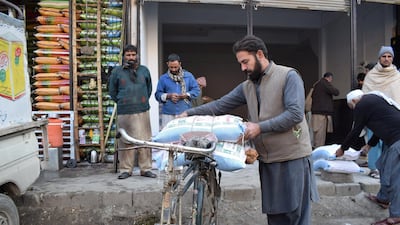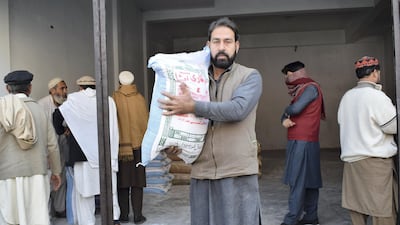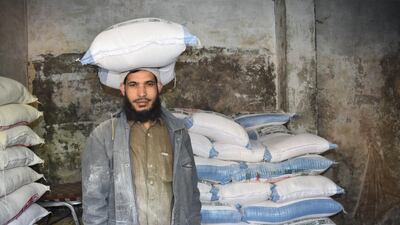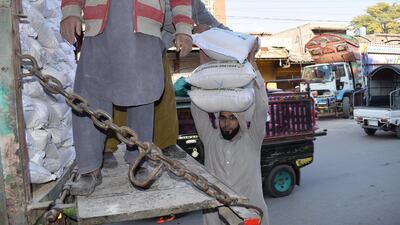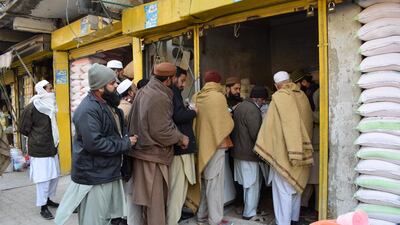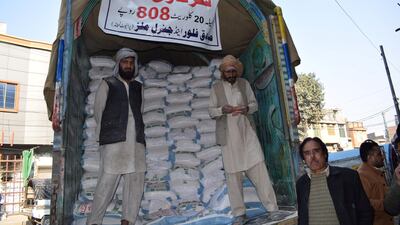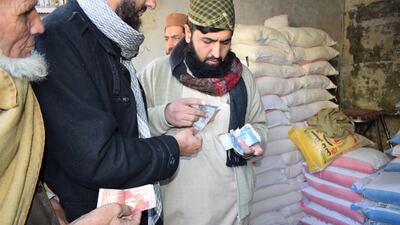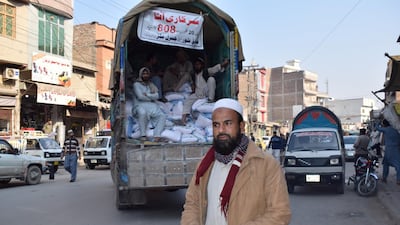On a cold winter's morning in the north-western city of Peshawar, in Pakistan, there is a commotion in the old Rampura Gate Gazaar flour market, where people are queuing to buy wheat flour from government supply lorries.
Loading two sacks of flour on to his bicycle, Yousaf Jan is relieved as a flour crisis in the country caused by a nationwide shortage of wheat has forced the government to provide a rationed flour subsidy to the public.
“I waited for three days to get flour and travelled a long distance, as the bread makers are on strike and my family is suffering," says Mr Jan, 36, a daily wage worker.
The government is rationing the distribution of flour amid rising prices, however subsidised sacks quickly disappear from the lorries supplying the food staple, leaving many empty handed.
Wheat flour is a foot staple for Pakistan's population of 208 million and its higher price is posing a serious problem for Prime Minister Imran Khan's government, which is already struggling with a faltering economy.
The shortage, however, has drawn serious criticism of Mr Khan’s government as the opposition, his coalition partners and economists raised serious concerns about bad governance amid stagnant growth.
“The crisis emerged due to bad governance, lack of capacity and wrong estimations," says Ashfaq Khan, an economist and the dean of special sciences and humanities at the National University of Sciences and Technology in Islamabad. "The government has over-estimated the crop production to improve the gross domestic product rate. There is also a political element [to the] flour crisis as in the past the high prices of flour remain a major factor in the toppling of past governments in Pakistan."
Agriculture, the most important economic sector of Pakistan, has been neglected in the recent years, leading to shortages of wheat across the country.
This has sent flour prices spiralling upward in recent weeks. Traders in Peshawar market say a 20 kilogram flour bag now sells for 1,100 Pakistani rupees (Dh26), up from 800 Pakistani rupees in June last year, leaving poor households unable to afford the staple.
Flour and bread have also disappeared from wholesale and retail shops with bread makers shutting up shop to protest about the higher flour prices and the government's bid to sell the foodstuff at controlled prices.
For those queuing at the old Rampura Gate Bazaar flour market, many were left empty-handed after waiting for hours to buy subsidised flour bags.
“I came here again today to get flour from the government lorry but I waited for one hour and could not get a single bag," says Ashfaq Ahmad, a carpenter. "There was a rush the other day as well and [I couldn’t get it at] the government store where the flour was not available."
Officials say the distribution limits of one or two bags per person will help to ease the crisis. This "could lead to equal distribution and more people" getting the item, says Shahab Uddin, the assistant commissioner monitoring the flour distribution in Peshawar.
But many in the queues say such measures should have been decided earlier to avoid the crisis altogether.
Pakistan produces 27.1 million tonnes of wheat a year and consumes 26.8 million tonnes according to the Ministry of National Food Security and Research (MNFSR). But analysts say the current crisis is caused by more than just the government's failure to manage a supply and demand balance.
"This is part of the ongoing governance crisis of the government and the flour crisis should have been anticipated months ago," says Farhan Bokhari, a Pakistan correspondent for The Financial Times.
The government decision earlier this month to approve the import of 300,000 tonnes of wheat to relieve the shortage has also faced serious criticism from opposition parties and economic experts saying it’s another poor decision as the local harvest will hit the markets in the coming months.
“The government has already decided to secure deals to avoid the crisis and buy wheat possibly from Russia, Kazakhstan or Ukraine as domestic demand is high and we are monitoring the situation," says Hashim Popalzai, the federal secretary at the MNFSR. “Hopefully the crisis will be overcome soon.”
Analysts have raised alarm bells about Pakistan’s stagnant economy activity, as the country struggles with painfully high inflation, a plummeting rupee and rising power prices.
The rupee has lost 35 per cent of its value since Imran Khan came to power in August 2018, with inflation reaching highs of 12.6 per cent in December, according to the State Bank of Pakistan.
Mr Khan's government received an international Monetary Fund bailout package of $6 billion (Dh22.03bn) in July last year to help it manage the tough economic conditions the country is facing. In a further boost, the UAE pledged Dh734 million in development aid at the start of this month during a state visit by Sheikh Mohamed bin Zayed, the Crown Prince of Abu Dhabi.
Despite the ban on wheat exports, introduced by the government in July last year to control prices in the domestic market, the country exported more than 600,000 metric tonnes of wheat, according to its bureau of statistics, from October 2018 to June 2019.
Temporary shortages of food products have been a common occurrence in the country over the last few years, with scarcity of tomatoes and sugar also causing long queues in the past.
Domestic gas tariffs have also increased 200 per cent since September 2018, while electricity prices have shot up by 50 per cent for the fifth time in a year, adding further financial strain to the country's poor and also contributing to rise of flour prices and other staples in the country.
“The temporary disappearance of staple products one after another from the markets and high prices are due to mismanagement of the government and hoarders," says Farrukh Saleem, a former government spokesperson for Imran Khan. "From these temporary crises someone is making millions through repeated import and export."
“There is no concept of relief for people under the IMF programme," adds Mr Khan.
Opposition parties are now demanding a fair and thorough investigation into the flour crisis, questioning why wheat is still being exported despite a ban.
“Imran Khan’s incompetent government is unable to improve the economic situation of the country and economic activity is at halt," says Marriyum Aurangzeb, the spokesperson for Nawaz Sharif’s PML N party.
